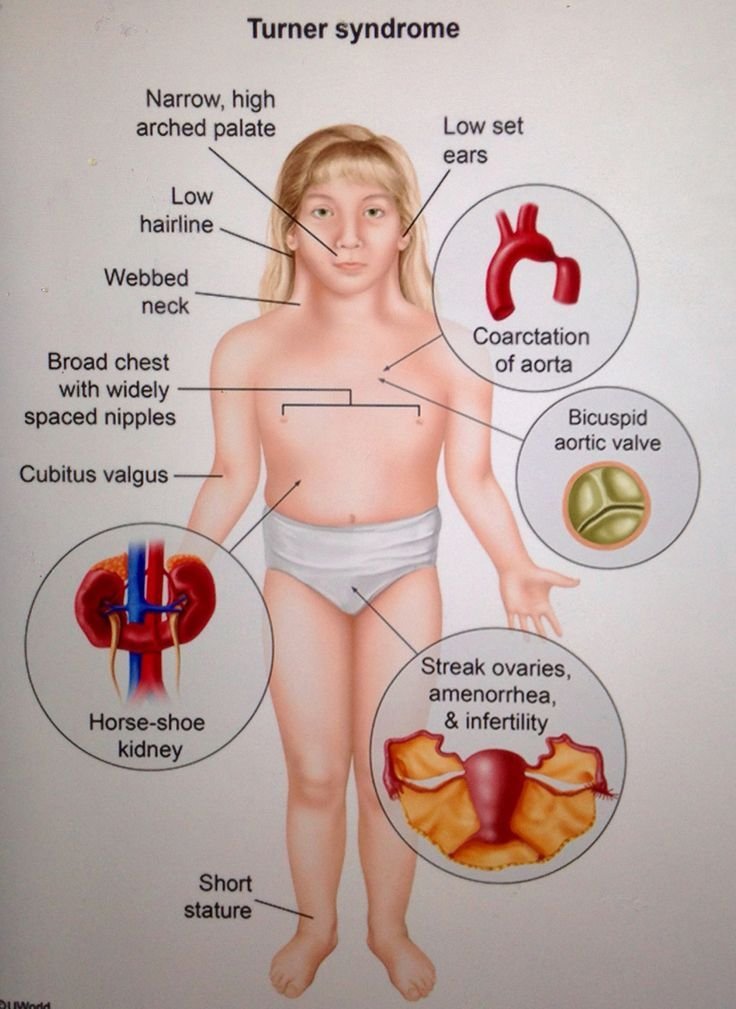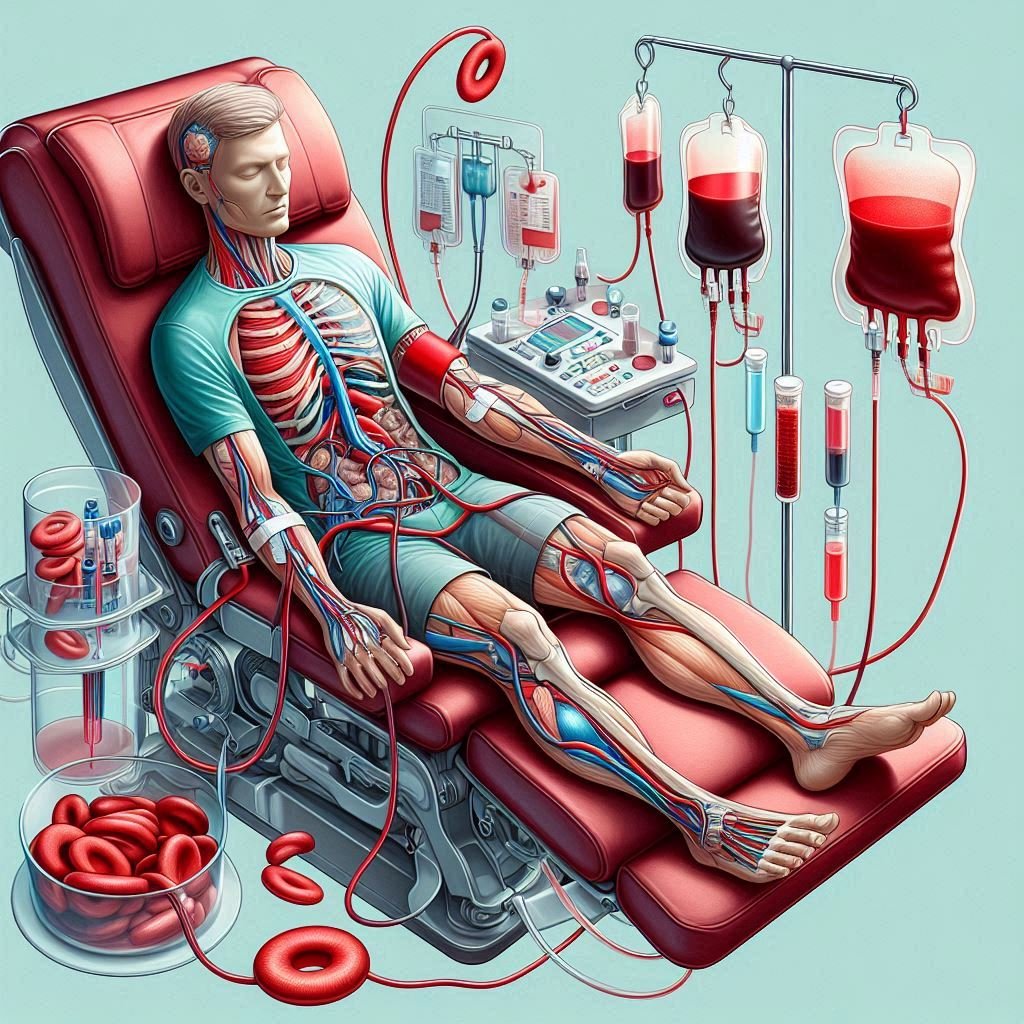
What is turner syndrome?
Turner syndrome, also known as 45,(X0) is a genetic condition that affects females. It occurs when one of the X chromosomes (sex chromosomes) is completely or partially missing. Normally, females have two X chromosomes (XX), but individuals with Turner syndrome typically have only one X chromosome (X0).
It is named after Dr. Henry Turner who first described it in 1938, this syndrome occurs when one of the two X chromosomes normally found in females. It affects approximately 1 in every 2,500 female births.
Symptoms
Turner syndrome can manifest with a variety of symptoms, which may vary in severity among affected individuals.
1.Short stature: Girls with this syndrome typically have shorter-than-average height, often becoming apparent by age 5.
2.Delayed growth: Slow growth and delayed puberty are common, resulting in a shorter-than-average adult height.
3.Webbed neck: Some individuals may have extra folds of skin on the neck, known as a “webbed neck.”
4.Broad chest with widely spaced nipples: The chest may have a broader appearance than usual, and the nipples may be positioned further apart.
5.Low-set ears: Ears may appear lower than usual on the head.
6.Lymphedema: Swelling of the hands and feet due to a buildup of fluid (lymphedema) can occur in some individuals.

7.Infertility: Many girls and women with this syndrome experience infertility due to ovarian dysfunction, which can lead to irregular or absent menstrual periods.
8.Heart defects: Certain congenital heart defects, such as aortic coarctation and bicuspid aortic valve, are more common in individuals with this syndrome.
9.Kidney problems: Some individuals may have kidney abnormalities, including structural issues or impaired kidney function.
10.Hearing loss: Sensorineural hearing loss, which affects the inner ear or auditory nerve, can occur in some cases.
Causes
Turner syndrome is primarily caused by abnormalities in the chromosomes, specifically the sex chromosomes. The most common cause is a complete or partial absence of one of the X chromosomes in females. This absence can occur randomly during the formation of reproductive cells (eggs) in either parent or shortly after fertilization. There are a few different chromosomal variations that can lead to this syndrome:

1.Monosomy X (45,X): This is the most common chromosomal abnormality in this syndrome, where one of the sex chromosomes is completely missing, resulting in a total of 45 chromosomes instead of the typical 46.
2.Mosaicism: In some cases, individuals may have some cells with a normal chromosomal makeup (46,XX) and other cells with a chromosomal abnormality characteristic of this syndrome (45,X). This condition is known as mosaic Turner syndrome.
3.Structural abnormalities: Rarely, individuals may have structural abnormalities of the X chromosome, such as deletions or rearrangements, which can lead to this syndrome.
Treatment
While there is no cure for Turner Syndrome, treatment aims to address associated health concerns and optimize quality of life. The treatment of this syndrome typically involves a multidisciplinary approach aimed at addressing the specific symptoms and medical issues associated with the condition. Here are some common aspects of treatment:
1.Growth hormone therapy: Many individuals with this syndrome undergo growth hormone therapy to help increase height and improve body composition. This treatment is usually started in childhood and can continue through adolescence.
2.Estrogen replacement therapy: Estrogen therapy is often initiated at the time of puberty to induce the development of secondary sexual characteristics, such as breast development and menstruation. This therapy also helps to promote bone health and reduce the risk of osteoporosis.

3.Monitoring and management of cardiac and renal abnormalities: Regular monitoring and appropriate management of congenital heart defects, such as aortic coarctation or bicuspid aortic valve, and kidney abnormalities are essential to prevent complications and ensure optimal health.
4.Fertility options: While many women with this syndrome are infertile due to ovarian dysfunction, fertility options such as assisted reproductive technologies (e.g., donor eggs or embryos, in vitro fertilization) may be available for those who desire to conceive. It’s important to discuss fertility options with a healthcare provider who specializes in reproductive medicine.
5.Psychological and educational support: Individuals with this syndrome may benefit from psychological support and counseling to address any emotional or social challenges they may face due to their condition. Educational support may also be necessary to address any learning difficulties or special needs.
6.Hearing and vision assessments: Regular assessments of hearing and vision should be conducted to monitor for any changes or complications that may arise.
7.Bone health: Maintaining good bone health is important for individuals with this syndrome, as they may be at increased risk of osteoporosis. Calcium and vitamin D supplementation, along with weight-bearing exercise, can help support bone health.
Is turner syndrome inherited?

Turner syndrome is typically not inherited in the conventional sense, as it is usually caused by random chromosomal abnormalities that occur during the formation of reproductive cells (eggs) in one of the parents or shortly after fertilization.
However, in rare cases, Turner syndrome can be inherited from a parent with chromosomal abnormalities or genetic mutations affecting the X chromosome. For example:
- A father with certain chromosomal abnormalities, such as a balanced translocation involving the X chromosome, may pass on an abnormal X chromosome to his daughter, resulting in Turner syndrome.
2. In very rare cases, a mother with a chromosomal abnormality affecting one of her X chromosomes may pass on an abnormal X chromosome to her daughter, resulting in this syndrome.
Impacts
Physical health: this syndrome can lead to a range of physical health issues, including short stature, delayed puberty, heart defects, kidney abnormalities, hearing loss, and infertility.

Psychological well-being: Individuals with this syndrome may experience psychological challenges related to their condition, including body image concerns, low self-esteem, anxiety, and depression. These issues may arise due to physical differences, fertility issues, social challenges, or coping with chronic health conditions.
Social interactions: this syndrome can affect social interactions and relationships, as individuals may face difficulties related to their physical appearance, short stature, or differences in development.
Educational and vocational opportunities: Learning difficulties, such as difficulties with spatial skills or math, may impact educational achievement for some individuals with this syndrome.
Reproductive and family planning: Infertility is common in individuals with Turner syndrome due to ovarian dysfunction. This can have emotional and practical implications for family planning and reproductive choices.

FAQ (frequently asked questions)
Q: What is Turner syndrome? Ans: Turner syndrome is a genetic condition that affects females, characterized by the complete or partial absence of one of the X chromosomes. It can lead to various developmental and medical issues, including short stature, infertility, heart defects, and learning difficulties.
Q: What causes Turner syndrome? Ans: Turner syndrome is primarily caused by chromosomal abnormalities, most commonly the absence of one X chromosome (monosomy X, 45,X). This abnormality typically occurs randomly during the formation of reproductive cells or shortly after fertilization and is not usually inherited from parents.
Q: What are the symptoms of Turner syndrome? Ans: Common symptoms of Turner syndrome include short stature, delayed growth, webbed neck, broad chest with widely spaced nipples, low-set ears, infertility, heart defects, kidney problems, and hearing loss. However, symptoms can vary widely among affected individuals.
Q: How is Turner syndrome diagnosed? Ans: Turner syndrome is often diagnosed based on physical examination findings, medical history, and chromosomal analysis (karyotype testing) to confirm the presence of chromosomal abnormalities, such as monosomy X or mosaic Turner syndrome.
Q: Is there a cure for Turner syndrome? Ans: There is no cure for Turner syndrome, but various treatments and interventions are available to manage symptoms and improve quality of life. Treatment may include growth hormone therapy, estrogen replacement therapy, management of associated medical issues, psychological support, and educational assistance.
Q: Can individuals with Turner syndrome have children? Ans: Many individuals with Turner syndrome are infertile due to ovarian dysfunction. However, fertility options such as assisted reproductive technologies (e.g., donor eggs or embryos, in vitro fertilization) may be available for those who desire to conceive. It’s important to discuss fertility options with a healthcare provider.
Q: What is the life expectancy for individuals with Turner syndrome? Ans: With appropriate medical care and management of associated health issues, individuals with Turner syndrome can have a normal life expectancy. However, regular monitoring and follow-up care are essential to address any health concerns and optimize overall health and well-being.
Q: Where can I find support and resources for Turner syndrome? Ans: There are many organizations and support groups dedicated to Turner syndrome that offer information, resources, and support for individuals and families affected by the condition. These organizations often provide educational materials, online forums, and opportunities to connect with others facing similar challenges.
Conclusion
Turner Syndrome presents unique challenges for affected individuals and their families, encompassing various medical, developmental, and psychosocial aspects. With early diagnosis, comprehensive medical care, and supportive interventions, individuals with Turner Syndrome can lead fulfilling lives and achieve their full potential. Continued research into the underlying mechanisms of Turner Syndrome and advancements in treatment modalities hold promise for further improving outcomes and enhancing the quality of life for those affected by this condition.
Table of Contents
Read more about turner syndrome
Go and visit dusearchit.in and get more knowledge about others topics.
